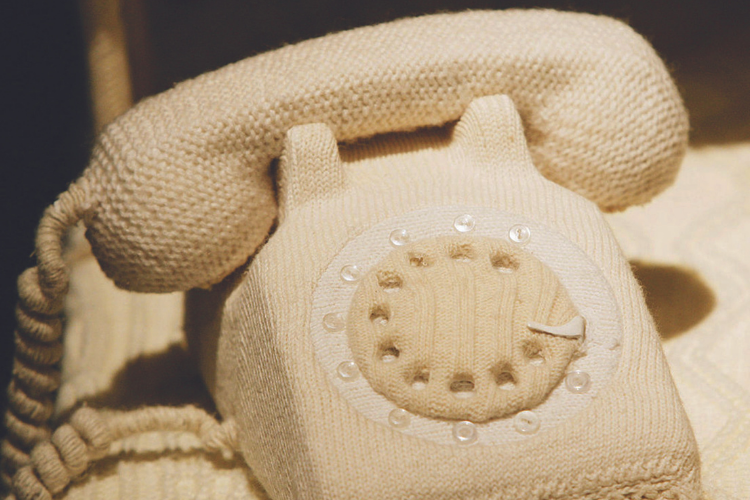
Fiction: Knit. Purl. Repeat.
Rochell fingered the pattern of the cable stitch on the robin’s-egg-blue sweater-vest for her son Ari. Her hands twitched as if to repeat it. So maybe it wasn’t a summer garment. But when autumn leaves vanished and November monochrome settled, it would cheer him up. She could box it now, mail it then.
Whenever Rochell bound the final seams on a hand-knitted project, she grieved a bit. She didn’t always have her next decision ready, and the empty needles depressed her. Her grandmother would have despised such self-pity.
“She hardly tackled anything more creative than darning socks,” Rochell protested, aloud. “How would she know?” Since Jerry’s death, she’d taken to talking even when nobody heard her. The absence of all conversation, even argument, drove her nuts. She’d never meant to end up widowed in northern Vermont, where people expected you to shovel your grief as if it were an inconvenient April blizzard, watch it melt, and get on with life. Get over it.
Better to let the crazy out by speaking it, as if Jerry still sat nearby. Nobody cared, right? Of course, her older son maintained that the phone company could listen to you all the time, through the microphone grid on the cellphone, on or off. Ari’s endless suspicion stuck like epoxy to his brilliance, his gift of tongues that paid so well on his translation assignments.
Without a vaccine, Ari wouldn’t be allowed to fly to Geneva next year to work at the environmental conference. According to her son, the vaccine turned a person into a biodevice. Actually she suspected he hated needles, and invented a reason to refuse. Rochell wondered whether there’d be a capsule to swallow by next spring. Of course, Ari might not trust a capsule, either. Recently he’d stopped eating her apple pies when he drove the four hours to come see her—something in the processing of vegetable shortening alarmed him. So, not such a big deal, she changed to an all-butter crust recipe. Vermont butter, just to reassure him.
Nana never baked pies. Apfel strudel, yes, and Jewish apple cake. Once, Rochell asked Nana what made it Jewish. “The oil, of course.” What, was the cake supposed to be a Hannukah symbol, burning for eight nights? Rochell knew better than to say that aloud, even now, but it made her smile. Jerry’d pointed out gently, in bed one night, that a cake with oil instead of butter could be served after a meat meal. Everything dated back to something else, tradition inside tradition like painted nesting dolls. Russian dolls, they were called. Not Jewish.
Aloud, she answered herself: “But it all nests inside the war, doesn’t it?”
The war. The camps. The Shoah. New to her tongue, the “murders.” In her childhood, people said quietly, “He died during the war.” Now they declared, “He was murdered at this camp, that camp.” They spoke the crime, the place, even sometimes the killers. Saying it bluntly like that, well, Jerry hadn’t liked it much.
Rochell tested the notion of talking so bluntly, as she put away an extra skein of yarn: “My grandmother loved one of her sons, left the other to manage on his own. My father did the same to his daughters. I love both of my sons. But one of them is wounded, is damaged. It all dates back to the war.”
She ran a finger across her lips. Zip. Speaking alone, without any microphone or grown son to hear, that was one thing. G-d forbid that Ari should know she’d ever called him damaged. “It’s not the person,” she clarified to Hashem. “It’s the thought process.”
Her dad had said the same about his brother Franz. During the war, when the brothers were child refugees missing their parents, Franz served as Big Brother Protector at the boys’ very British boarding school. As an adult, though, he didn’t hold jobs well. Or marriage. “He doesn’t think like other people do,” her dad insisted. “In math, he’s a genius. You just have to ignore his eccentricity.”
Rochell argued now, while peeling a boiled egg for her lunch: “Eccentric? You call it eccentric, to pick the lock to the bathroom and stand there staring at Karen, sitting on the toilet? No wonder she came out strange herself. You never stood up for her, did you, Dad? Made her stay abroad her whole junior year of high school, when the host family kept her practically a prisoner, too. Eccentric? You made sure she’d feel unsupported forever. It’s your fault.”
Karen lived more than six hundred miles from Rochell. On good days, Rochell thought it was a shame they couldn’t just visit. On bad ones, she thanked her stars for the distance. Still, she should try to do something for her little sister, now that she wasn’t tending to Jerry. As for Ari, well, she should be able to take a family trip south without micromanaging his life while she was gone, right? Wasn’t that one of the things he repeated, in his intense moments: that she always tried to take him over? Of course, he obsessed about her brain waves buzzing at him—not that those were impossible—but still. She should go visit Karen and do something nice for her. It would even prove she wasn’t some kind of helicopter parent to Ari.
Setting aside the sweater for steaming and blocking on a cooler afternoon—today would reach the high seventies, almost hot, for northern New England—she built an inner image of how she could help Karen catch up on laundry. Spring clean the kitchen, so what if summer heated up a lot more in the Carolinas. Karen had central air conditioning. Maybe Rochell could find in Karen’s attic (and this was a serious motivator) the letters their parents had written each other when courting after the war, letters that her younger sister seized years ago, promising to share copies but never getting to it. Yes, Rochell should visit.
All the government and media advice approved of vaccinated family members getting together. If she stayed in Karen’s guest room it would save money and she could do more things for her sister. She lifted her phone and picked her sister from the frequent calls. While the number connected, she began a to-do list in her thoughts. What about taking Karen’s jewelry to be cleaned and appraised? The last fine pieces from Nana’s collection were, of course, at Karen’s house, probably not even insured.
Nana’s journal from the nineteen thirties and forties made Rochell suspicious about all those jeweled bracelets and gold chains. Clearly Nana wasn’t one to spend good money on luxuries. In Rochell’s childhood, Nana’s visits involved not wasting any scrambled egg in the frying pan, not discarding a shirt that could be mended, keeping spare buttons on hand. The long steady revelation of her grandfather’s infidelities, the mistresses at the bank and elsewhere, suggested that elegant presents served as apologies, or even pay-offs: Don’t make a fuss, and
you’ll get a gift. Ugh.
Karen answered after four and a half rings, and began her usual litany of health and weather complaints. Rochell waited for a few to pass by, then interrupted: “Do you still have Nana’s jewelry?”
A stiff pause. Then Karen said, “Of course. Why would you ask that?”
“Why do you think she held onto it? After, you know. And why did she give it to you?”
Another pause. “Well, after all,” Karen’s voice conveyed well-performed woundedness, “she was very close to me. I think she wanted me to think of her, and to know I was special. To her. You were already Dad’s favorite, so she chose me. I was the cute one, after all.”
“Even when we were little?”
“Of course. All the photos show it.” In the background, a dog at Karen’s house began barking. “I have to go. Call you back later. But you know, I always told you, you should have gotten a nose job. You look too much like Dad, or like PopPop. Nana must have seen that.”
So many kinds of battle, so many kinds of war. Once, not long before her father died, Rochell asked him why he’d cheated—was it to follow the example of his own father?
“Not at all,” he’d assured her. “Your grandfather needed other women because of the war—your Nana couldn’t meet his needs, she was busy helping other people’s children and raising her own. She understood why he did it. It was the war, of course.”
“But what about you? Why did you do it?”
“Oh, I’m completely different. You know, I have survivor’s guilt. I can’t love deeply, can’t be faithful to just one woman.”
“And Mom knew that, in advance?”
Her father’s distant look suggested a vision of his own youth. “Maybe she didn’t really understand, at first,” he admitted. “We were going to start over, you know. Right before her heart failed. I was ready, then.”
Rochell couldn’t remember what she’d replied. Like Karen, her father displayed his wounds out in public back then: widower. In the prime of life. So sad. And both his daughters out of the house. Karen, of course, moved in with him temporarily, to pack and stage the family home, make sure it earned a good price on the market. Help Dad shop for his penthouse apartment in a nearby city.
That year, Rochell took time off from being the Good Older Daughter. Away at college, she’d indulged, frankly: heavy petting with Lenny, and hints to a guy she met playing pool that she’d like to try going all the way. Both Lenny and the other boy had dark curly hair, like her father’s had been when she was growing up, before he’d polished his persona into corporate management. Was it a pattern? Was something wrong with her? Picking out father substitutes? No. Look, she hadn’t even known Jerry was Jewish when they started going to protests together. His short haircuts didn’t curl, either. Anyway he wasn’t religious, just like she wasn’t.
Her thumb throbbed. Looking down, she realized she’d done more than bite the nail and chew the cuticle. Two cracks in the finger pad stung. She went to the “powder room,” as Jerry’d always called the little half-bathroom, and fumbled with ointment and a gauze-padded strip. She should add “clean out medicine cabinets” to her list for visiting Karen.
A text from Ari dinged, followed by a dozen more in quick succession. Not another major episode, please. Ever since the president had declared a war on terror—two decades already!—Ari’s sense of espionage around him had grown sharper, more pressing. Only his recent move to the coast of Maine, to a tiny village, seemed to soothe his agitation, as if the ocean at his side finally gave him the space he needed. She choked up for a moment. Space from her? Was she that kind of mother? No, she couldn’t be, because when he leapt into analyzing foreign affairs every few weeks, he always sent her links, and commentary. He needed her response on the war that he watched, that haunted him. So what if he emailed the White House in those moments? He needed her to read his passionate assertions, to send him heart emojis and smiley faces, to say “love you lots, sleep tight.”
Anyway, today’s text messages dealt with physics. Not insecticides or other global poisons. She replied “Fascinating” with some exclamation points, and the phone offered her the phrase “Thanks for sharing,” which she thumbed into action.
Max, her younger son, needed something else. Mostly she wasn’t sure what, other than periodic applause for the stream of awards for his. videos. She remembered what the students around her had chanted during the protests against the war in Vietnam: “The whole world is watching.” That seemed to be what Max wanted. Compared to the whole world, she was nothing much. But the emoji for clapping hands always sat in her “recently used” texting symbols, along with the gold stars she often sent him when she felt exhausted by Ari’s latest passions.
“I didn’t choose your brother over you,” she said aloud. “He was just born needing more.” She wondered whether that was the meaning of a birthright. Brothers always stood on the edge of battle, didn’t they? It was this culture, this competitiveness. Even if you raised them in Vermont, with plenty of space around them.
By now, Karen must have dealt with her mail delivery or whoever had turned her dog into a bark storm. Rochell pressed “call back” and got voicemail. “Tag, your turn.”
A news alert pinged. Another young driver shot and killed by police, this time in Florida. The three sentences leading the news article included the explanation that the driver had a history of mental illness.
Rochell choked on a bitter laugh. Who qualified to get shot, these days? Obviously anyone with dark skin, but also anyone like Ari, who sometimes called 9-1-1 to report his own neighbors.
She froze, picturing Ari in a conflict with some law enforcement team who wouldn’t understand him. No, she couldn’t travel south to solve Karen’s problems, even if they added up to hoarding or OCD or one of those other patterns the TV shows fingered. Obviously Ari needed her within driving distance of Maine. Needed her to cushion the frightening side effects of his brilliant brain. How could she travel out of New England, be so far away when any moment he could have a crisis? Unlike her father, she kept commitments.
Dominoes. During the Vietnam war, people had talked about the domino effect. Rochell didn’t have any dominoes now, although you could bet that Karen had a set. Maybe even the pieces from when they were kids. If you loved numbers and competition, you played according to the rules, and laid down long chains of the black rectangles with their inset white spots. But the wartime excuse referred to setting up dominoes on their butt ends, close enough together so if you knocked down one, the next one fell, and the next, all the way from Indochina to Red Communists to defeat of the Free World. Had the theory been debunked? Did Ari believe it?
Someone should have called the pandemic a domino effect. Why hadn’t they? Rochell texted Ari, hoping the question might satisfy him that she was paying enough attention. For the heck of it, she copied the query and also sent it to Max. It might be days before he looked at a message from her, since he stayed so busy, but who knew?
On a fresh piece of paper, she began a new list. Things she should document, so her sons might understand their family tree, the family changes. She really only knew the parts that came after the war. And how they tumbled against each other, how they nested.
By the time Karen called back, Rochell had forgotten the point of controversy. But Karen brought it right back up. “To bad you didn’t have a dating life in high school.”
Stung, Rochell answered, “It was the Vietnam war protests. We didn’t date. We made meaningful political actions. When I was a senior, Theo Kaplan took me to Newark to stuff flyers in envelopes.” She hesitated, sure she’d never told her sister this. “Afterward we sat in his car, looking at a view, and knowing we were supposed to kiss, but not knowing how to start. I got so frustrated that a week later I got my first kiss from someone different, this guy called Vince, in the school basement.” She added with emphasis, “Obviously, he thought my nose was fine.”
“Mayy-bee,” Karen drawled. “You know, he gave me my first kiss, too, when I was a senior there. He probably was better at it by then.”
What! Five years later, Vince gave the same first kiss to her little sister? Rochell sputtered, knew she’d been totally out-played. Defeated. She couldn’t even think of a good comeback about Karen’s obvious problems. She finally choked out, “Gotta run, something on the stove,” and thumbed the phone to silent.
This felt like Nana’s fault. For not being fair, way back. For committing to one obviously broken, jobless son instead of to Rochell’s own father. For letting their grandfather get away with womanizing, using the war as an excuse. For the unspeakable war itself, so big and horrible and shattering that nothing else could stand up against it, its effects pouring down, generation to generation, l’dor v’dor, wound upon scar. Did Nana really like Karen better than Rochell? And in high school, did Karen kiss better, sooner, differently? Did she still?
Then it struck her: Karen followed five years behind her in grade level. Unless Vince stayed back twice, he had to have graduated by the time Karen made her own journey to the school’s shadowed basement corridor. Maybe Karen pretended she’d kissed the same boy. But she couldn’t have.
Rochell pulled apart Karen’s words and named them “little sister, lying.” Named them false, as false as her father’s so-called survivor guilt that let him play around. Harmful lies, at that. Without thinking why, she pulled out some skeins of yarn, placed them on the kitchen counter, moved them around as if planning a sweater. Or a painting, even. None of these colors would look good on Karen. They were Rochell’s own favorites,
though, browns and yellows and deep forest green. She should knit something for her own autumn ahead. Black and dark gray of
course made her look slim, or at least less large. But she couldn’t handle endless grief, twenty-four-seven, and dammit, Jerry liked how she looked. Nose and all. “Lies!” she repeated aloud.
Maybe Ari, with his edged awareness of threat, could picture people’s lies in full color, or feel their sinister vibrations. Rochell didn’t need to. She fought Karen’s words this time as if they were stitches in a sweater already on the knitting needles, where the yarn could pull apart, row after row, undoing the twists and pain. All the way back, she thought.
All the way back to the war.
Beth Kanell lives in northeastern Vermont, with a mountain at her back and a river at her feet. She’s a published poet, novelist, historian, and memoirist—and shares her research and writing process at BethKanell.blogspot.com.
“Domestic Interior” by Janet Morton.




